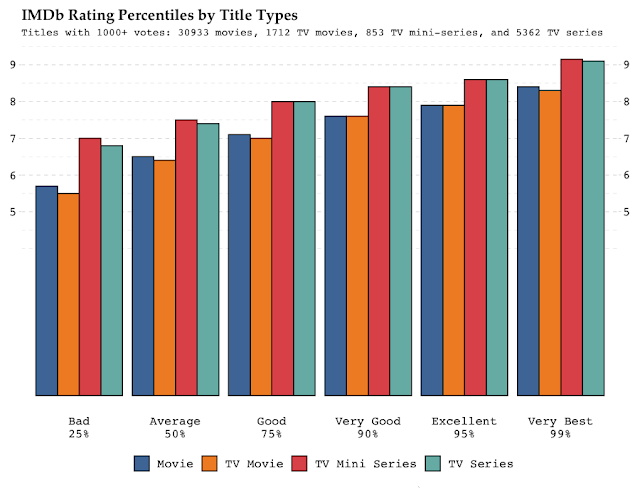1. Introduction
IMDb, or the Internet Movie Database, is an online database that provides comprehensive information about films, television shows, actors, and other industry professionals. IMDb ratings, often referred to as the "IMDb score," are numerical ratings given to movies and TV shows by users of the website.Filmmakers, industry professionals, and audiences alike rely on IMDb ratings as a valuable tool for making informed decisions about which movies and TV shows to watch or invest in, making them an integral part of the entertainment landscape.Also Read This: How to Create a Portfolio with Behance
2. Understanding IMDb Ratings

a) Calculation of IMDb Ratings
IMDb ratings are calculated using a weighted average formula. The formula takes into account the number of votes cast for a title and the individual ratings given by users. The average rating is adjusted to minimize the impact of extreme ratings and to give more weight to higher votes.b) Factors Considered in IMDb Ratings
IMDb ratings primarily reflect the opinions of the general audience. The ratings are influenced by factors such as the overall quality of the production, performances, direction, and other elements that contribute to the entertainment value of a title. The ratings are not influenced by industry insiders or critics.c) User Reviews and Their Impact
IMDb allows users to write reviews along with their ratings. These user reviews can provide additional insights into the strengths and weaknesses of a title. While the rating itself is based on a numerical value, user reviews offer subjective opinions that contribute to the overall perception of a title's quality.Understanding IMDb ratings is essential because they have a significant impact on various aspects of the entertainment industry:d) Audience Decision-Making
IMDb ratings serve as a valuable resource for audiences when making decisions about which movies or TV shows to watch. Users often rely on IMDb ratings to gauge the consensus about a title's quality before investing their time and money into it.e) Filmmakers and Industry Professionals
IMDb ratings can have a profound influence on the success of a film or TV show. Positive ratings can attract a larger audience, increase box office revenue, and lead to greater commercial success. Moreover, IMDb ratings can contribute to a title's critical acclaim, potentially opening doors for filmmakers.f) Feedback and Interaction
IMDb ratings and user reviews provide a platform for audiences to share their opinions and engage in discussions about movies and TV shows. This feedback loop between creators and viewers allows for a deeper understanding of audience preferences and can influence future productions.g) Controversies and Limitations
It is important to acknowledge that IMDb ratings are not without controversies and limitations. Additionally, IMDb ratings reflect the opinions of the users who participate, which may not represent a diverse range of perspectives.In conclusion, understanding IMDb ratings involves recognizing their calculation methodology, the factors that contribute to them, and their influence on audience decision-making and the entertainment industry.Also Read This: The Best Practices for Organizing Images on Behance to Create a Stunning Portfolio
3. Influence on Audience Decision-making:
 IMDb ratings play a significant role in shaping audience decision-making when it comes to choosing which movies or TV shows to watch. Here are some key points explaining their influence:
IMDb ratings play a significant role in shaping audience decision-making when it comes to choosing which movies or TV shows to watch. Here are some key points explaining their influence:a) Reliable Source of Information
IMDb has established itself as a trusted platform for accessing information about movies, TV shows, and related content. The ratings provided by the IMDb community are seen as reliable indicators of the overall quality and reception of a title. Audiences often turn to IMDb ratings to gather insights and make informed choices.b) Quick Assessment of Quality
IMDb ratings offer a quick and easily understandable measure of a title's quality. The numerical rating, usually ranging from 1 to 10, allows audiences to gauge the consensus on whether a movie or TV show is worth their time.c) Popularity and Trend Analysis
IMDb ratings also indicate a title's popularity and impact. High ratings, combined with a large number of votes, can suggest that a movie or TV show has resonated with a wide audience and gained significant attention. This popularity factor can influence audiences.d) Peer Recommendations:
IMDb ratings often serve as a basis for word-of-mouth recommendations among friends, family, and online communities. Positive ratings can create a sense of confidence and assurance, making audiences more inclined to choose a title based on the experiences of others.e) Access to User Reviews:
In addition to ratings, IMDb also allows users to write reviews expressing their opinions and providing more detailed insights into a title's strengths and weaknesses. The combination of ratings and user reviews helps audiences make more informed decisions.Overall, IMDb ratings have a strong influence on audience decision-making by providing reliable information, quick assessments of quality, insights into popularity and trends, peer recommendations, and access to user reviews.Also Read This: How Do You Crop in Behance: Adjusting Your Portfolio’s Visuals for Better Presentation
4. Alternative Rating Systems in IMDb
IMDb (Internet Movie Database) is a popular online platform that provides information about movies, TV shows, actors, and more. One of the notable features of IMDb is its rating system, where users can rate movies and TV shows on a scale of 1 to 10.a) Weighted Rating Systems
- Description: Bayesian Average is a statistical method that takes into account both the average rating of a movie and the number of ratings it has received.
- Benefits: This system can mitigate the influence of extreme ratings and give more weight to movies with a higher number of ratings, providing a more accurate representation of a movie's overall quality.
b) Normalized Rating
- Description: The Normalized Rating system adjusts the rating of a movie based on the average rating of all movies on IMDb. It helps address the issue of inflation or deflation of ratings over time.
- Benefits: By normalizing ratings, this system allows for fairer comparisons between movies from different time periods, preventing older movies from being overshadowed by newer releases.
c) Content-Specific Ratings
- Description: This rating system involves categorizing movies into specific genres (e.g., action, comedy, drama) and allowing users to rate movies within each genre separately.
- Benefits: Genre-specific ratings can provide more accurate recommendations and cater to specific preferences of users who have a preference for certain genres.
d) The story, Acting, and Technical Ratings
- Description: This system allows users to rate movies based on different aspects such as story, acting, and technical elements (cinematography, sound design, etc.) individually.
- Benefits: By providing separate ratings for various aspects, this system gives a more detailed understanding of a movie's strengths and weaknesses, helping users find movies that align with their preferences for specific elements.
e) Review-Based Systems
- Description: Instead of relying solely on numerical ratings, this system emphasizes user-written reviews, where users can express their opinions and provide detailed feedback on movies.
- Benefits: User reviews can offer more nuanced insights into a movie's qualities, allowing users to understand different perspectives and make informed decisions. It encourages thoughtful discussions and community engagement.
f) Critic Consensus
- Description: In this system, professional critics' reviews are aggregated to form a collective rating or consensus about a movie.
- Benefits: By considering the opinions of experts, the Critic Consensus system provides users with a curated evaluation of movies. It can help users discover critically acclaimed movies and explore a broader range of cinema.
Also Read This: Elevated Comedy: Soaring with “How High” on IMDb – Discovering the IMDb Details
5. Impact on Filmmakers and Industry Professionals
a) Box Office Success
IMDb ratings can have a direct impact on the box office performance of movies. Positive ratings and reviews can generate buzz and attract a larger audience, leading to increased ticket sales. High IMDb ratings can serve as a marketing tool, encouraging more people to watch a film and potentially boosting its financial success.b) Critical Acclaim and Recognition
IMDb ratings contribute to a title's critical acclaim and recognition within the industry. Positive ratings indicate that a film or TV show has resonated with audiences and received positive reception. This can lead to nominations and awards, as well as increased visibility and respect among critics, industry insiders, and award voters.c) Impact on Actors
IMDb ratings can also influence the careers of actors. Positive ratings for a film or TV show can reflect well on the performances of its cast members, potentially leading to increased visibility, recognition, and future acting opportunities. It can help actors establish themselves as bankable and talented performers in the industry.d) Decision-making by Industry Insiders
IMDb ratings are not only relevant to audiences but also considered by industry insiders, including producers, executives, and casting directors. These professionals take into account the ratings and reception of films and TV shows when making decisions about funding, distribution, casting choices, and overall project viability.In summary, IMDb ratings have a tangible impact on the careers of filmmakers and industry professionalsAlso Read This: How to Add a Video to Behance: Uploading Multimedia to Enhance Your Projects
6. Controversies and Limitations
While IMDb ratings have their benefits, they are not without controversies and limitations. It's important to be aware of these factors when considering the reliability and influence of IMDb ratings. Here are key points regarding the controversies and limitations associated with IMDb ratings:a) Manipulation of Ratings
IMDb ratings can be susceptible to manipulation. Some individuals or groups may attempt to artificially inflate or deflate ratings by submitting multiple votes or coordinating efforts to boost or undermine a title's rating. This manipulation can distort the true perception of a movie or TV show's quality.b) Limited Sample Size
IMDb ratings are based on the opinions of a specific subset of the audience who actively participate in rating and reviewing titles on the platform. This sample size may not represent the broader population's opinions and preferences, potentially leading to an incomplete or skewed representation of a title's quality.c) Lack of Context
IMDb ratings provide a numerical score but do not provide detailed context for individual ratings. It may be challenging to discern why users gave specific ratings or the specific aspects of a title that influenced their opinions. Without additional context, it can be challenging to fully understand the reasoning behind a rating.d) Demographic and Cultural Biases
IMDb ratings can be influenced by demographic and cultural biases. This can lead to variations in ratings based on geographical or cultural factors, potentially affecting the accuracy and representativeness of the overall rating.It's crucial to consider these controversies and limitations when interpreting IMDb ratings.Also Read This: How to Change Your Behance Banner: Customizing Your Portfolio’s Visual Identity
7. Feedback and Interaction
a) Audience Feedback:
IMDb ratings provide audiences with the opportunity to express their opinions and provide feedback on movies and TV shows they have watched. Users can rate titles and write reviews, sharing their thoughts on various aspects such as performances, plot, direction, and overall enjoyment. This feedback helps other users make decisions and offers valuable insights to filmmakers.b) Filmmakers' Response to Ratings:
Filmmakers and industry professionals often pay attention to IMDb ratings and user reviews. They can gain insights into audience reactions, preferences, and areas of improvement through the feedback provided. Some filmmakers actively engage with audiences by responding to reviews.c) Understanding Audience Preferences:
IMDb ratings serve as a barometer of audience preferences and tastes. By analyzing the ratings and user reviews, filmmakers can gain a better understanding of what resonates with viewers and tailor their future projects accordingly. This feedback loop helps in creating content that aligns with audience expectations and interests.d) Impact on Filmmaking Decisions:
IMDb ratings and user reviews can influence the decision-making process for future projects. Filmmakers and industry professionals take into account the feedback received on their previous work, considering both positive and negative aspects.In conclusion, IMDb ratings facilitate feedback and interaction between audiences, filmmakers, and industry professionals.#BringWynonnaHome #WynonnaEarp#Earpers this is IMPORTANT!⚠️⚠️ The IMDb answered me! And they asked me to post my feedback in the IMDb user community so people can vote. And like they said "This will allow us to measure the level of interest and may help with future improvements" pic.twitter.com/24XGKqVTeC
— Bring WE Home!🏳️🌈 (@E4L_Wayhaught) April 22, 2021

 admin
admin








